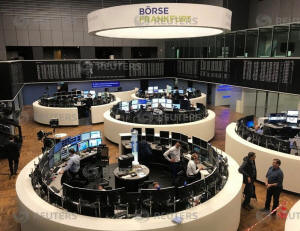|
Stocks surge after China-U.S. trade
truce, Wall Street set for jump
 Send a link to a friend
Send a link to a friend
 [December 03, 2018]
By Virginia Furness [December 03, 2018]
By Virginia Furness
LONDON (Reuters) - A truce between U.S. and
Chinese leaders on trade tariffs boosted global markets on Monday,
fuelling an advance of nearly one percent by world stocks, setting up
gains on Wall Street and pushing emerging-market currencies higher
against the dollar.
Equity futures showed all three New York indexes set for a strong
session, with the tech-heavy Nasdaq seen opening 2.3 percent higher
<NQc1> while futures for Dow Jones and S&P500 rose 1.6 to 1.9 percent
<1YMc1> <ESc1>.
European benchmarks rallied almost across the board. Germany's DAX <.GDAXI>
- the most sensitive to China and trade war fears - led the way with a
2.5 percent rise to its highest since Nov. 14.
The gains came after China and the United States agreed at the weekend
to halt additional tariffs. The deal should keep their trade war from
escalating as they try to bridge differences with talks aimed at
reaching a deal within 90 days.
U.S. President Donald Trump also said "China has agreed to reduce and
remove tariffs on cars coming into China from the U.S. Currently the
tariff is 40 percent". That helped boost European autos more than 4
percent <.SXAP>.
The trade truce was the latest "circuit breaker" needed to trigger a
return to risk appetite, said Guillermo Felices, head of research and
strategy in the Multi-Asset, Quantitative and Solutions team at BNP
Paribas Asset Management,
"The first was markets pricing in a more dovish Fed, the second, more
aggressive policy stimulus by the Chinese authorities and the third,
easing trade tensions," he said.

Felices cautioned, however, that negotiations had reached a "ceasefire"
rather than lasting peace.
"China can deliver on the easy things like buying more agriculture as
they need those goods, but when you go into the territory of
intellectual property, and industrial and technology policy, you are
clashing with China's long-term aims," he said.
MSCI's all-country world index <.MIWD00000PUS> climbed 0.8 percent in
its sixth straight day of gains and hit its highest since Nov. 9.
Emerging-market equities <.MSCIEF> rose two percent and were set for
their strongest day in a month.
Graphic: U.S.-China trade truce boosts world stocks - https://tmsnrt.rs/2RAGHgx
Asian shares kicked off the rally, with Chinese markets <.CSI300> <.SSEC>
rising more than 2.5 percent and Japan's Nikkei <.N225> soaring to
six-week highs.
The risk-on mood saw MSCI's index of emerging-market currencies rise 0.7
percent <.MIEM00000PUS>, led by China's yuan, which saw its biggest
daily gain since February 2016 <CNY=CFXS>.
However, the dollar started to recover after slumping as much as half a
percent earlier against a basket of currencies <.DXY>. By 1145 GMT, it
was just 0.2 percent lower, knocking the euro off the day's highs <EUR=EBS>.
Sterling, meanwhile, dropped as Brexit nerves returned. Against the
dollar, the pound <GBP=D3> fell to its lowest since October at $1.2708,
down nearly 0.7 percent from the day's highs. Against the euro <EURGBP=D3>,
it slipped 0.3 percent to 89.05 pence.
[to top of second column]
|

The German share price index, DAX board, is seen at the stock
exchange in Frankfurt, Germany, March 21, 2018. REUTERS/Tilman
Blasshofer

"Until the British parliament votes on the deal next week, we are going
to see a steady drumbeat of Brexit headlines, which is going to keep the
pound weak," Danske Bank strategist Morten Helt said, referring to a
Dec. 11 lawmakers' vote on Prime Minister Theresa May's agreement on
leaving the European Union.
However, the dollar has already come under some pressure from a recent
shift by the U.S. Federal Reserve to a slightly more dovish stance.
Comments by Federal Reserve Chair Jerome Powell were interpreted by
markets as hinting at a slower pace of rate increases.
Powell was scheduled to testify later this week to a congressional Joint
Economic Committee.
The latest market rally would not bring a return to a more hawkish Fed
stance, Berenberg economist Florian Hense said. "We would need to see
some rebound in economic activity to lift expectations of more rate
hikes," Hense said.
U.S. Treasury yields pulled back from Friday's over-two-month lows.
Ten-year yields traded around 3.03 percent <US10YT=RR>.
Germany's 10-year government bond, the benchmark for the euro area,
initially rose four basis points to 0.347 percent <DE10YT=RR>, but eased
back to 0.32 percent.
Yields on riskier southern European bonds were down across the board,
though Italian bonds trimmed some gains after the European Central Bank
revealed Italy's share of ECB capital would be cut slightly.
Ten-year yields stayed close to two-month lows, however <IT10YT=RR>.
Elsewhere, oil soared more than five percent after posting its weakest
month in more than 10 years in November, losing more than 20 percent as
global supply outstripped demand.
(Reporting by Virginia Furness, additional reporting by Wayne Cole and
Hideyuki Sano in Sydney and Tokyo; editing by Jon Boyle, Larry King)
[© 2018 Thomson Reuters. All rights
reserved.]
Copyright 2018 Reuters. All rights reserved. This material may not be published,
broadcast, rewritten or redistributed.
Thompson Reuters is solely responsible for this content.

 |